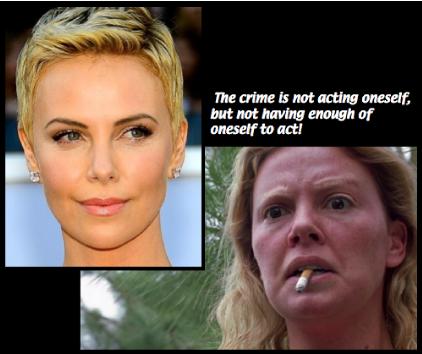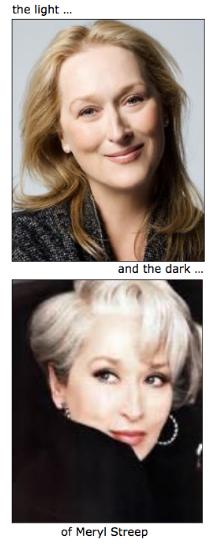![]()

The Spotlight casting directory was traditionally divided actors into lead actors and character actors. Whereas there were obviously far more character parts than there were leading parts, the section of the directory devoted to “Leading Actors” was always much fatter than that devoted to “Character Actors“. Those in the latter section accepted that they would be cast as a certain type; whereas those in the “Lead” section lived the myth that they could play any role that was worthy of their talent.
Actors want to escape from who they are, to be astonished and amazed by themselves, like someone falling in love. They want to be seen with new eyes. but the director, more pointedly, wants to strip the actor’s personality bare and reveal the truth of that individual. It is those rare moments when the soul of that particular person comes through that really count. The director is searching not for for an ever changing chameleon, but the unique actor who can fulfil the role like no other.
On more than one occasion, I found myself with, what I considered to be, the perfect part for a certain actor — I checked out whether s/he was available — they were — fantastic! Could I send the script over? They would love to see it. Then, a wait , before back came the answer, “No” — at this time they wanted to take their career in a different direction. Perhaps; when they were so funny, why did no one see their comic side? Or, maybe; when they were so cut-up after their girlfriend left, why did no-one see their sensitive side? These narcissistic fantasies of chronic dissatisfaction seem to sweep over artistes at various times. So, I soon gave up chasing star actors or trying to second guess their current predilections.
As soon as actors have the power to turn things down they seem to get a kick from doing just that. No sooner are they in demand for one kind of role than they are searching for something completely different. It would seem that they simply love playing hard to get. They may only work for a couple of months in the year but still they would rather stay pondering the vicissitudes of their star status than commit to a new role and have to make real acting choices, rather than just whimsically casting about.
 Surely, the ultimate absurdity of star miscasting came in taking one of the world’s most beautiful women, Charlize Theron, and then expending hours and hours of skilled professional effort to turn her into an ugly bitch for the title role in Monster. Senior make-up artist, Toni G described some of the work involved:
Surely, the ultimate absurdity of star miscasting came in taking one of the world’s most beautiful women, Charlize Theron, and then expending hours and hours of skilled professional effort to turn her into an ugly bitch for the title role in Monster. Senior make-up artist, Toni G described some of the work involved:
“She’s got this beautiful face, but she’s a very brave woman, because you’ve got to have the weight in order for the jowls to look right ... (Charlize put on some 30lbs in weight) ... Charlize’s eyebrows needed to be completely changed to frame her face differently so I took off all the outside part of her eyebrows, and also bleached them. Eyebrows are an amazing representation of what people go through in their lives. You can see an angry person, a happy person, a gentle person, all through the eyebrows ... Art [Sakamoto] took a dental impression, and then came up with some prototype
dentures, painting on the discoloration and detail....We had all those things together but she still had this creamy, poreless, gorgeous skin. With makeup, I had to create the years of abuse to her skin – all the freckles and capillaries and sun damage – either through hand-painting or working with an airbrush”
(www.themakeupgallery.info)
Charlize also went through a day-long “hair-frying and hair-thinning” session with hairstylist, Katie Swanson. Unlike De Niro’s transformation, from youth in the early scenes to middle-age in the late scenes, in Raging Bull there was really no point in this obscene morphing. To my mind it was an indulgent misuse of star power and no better than a white actor blacking up when there are a thousand black actors in line for the part.
For the talented actor no two roles are ever the same because the character’s given circumstances and feeling context are not the same. They are made unique through the power of the actor’s imagination. The subtextual, and often subconscious, choices by which the actor connects to the role makes it his own. This is what Meisner called particularisation; that is making a role personal through analogy. Ultimately all that an actor can truthfully play is himself in unforeseen circumstance and situations. The director, Charles Marowitz summed it up:
“The resourceful actor, because he has more to draw on, will give the appearance of variety by simply utilising the abundance of his nature. The resourceless actor, unblessed with such abundance, can do no more than exhibit his paucity in half a dozen slightly modified versions. The crime is not acting oneself, but not having enough of oneself to act!" (23)
 And, as a corollary, all that a director can do is attempt to bring out one side of an actor’s personality over another or bring to the fore qualities that were previously hidden. In an interesting recent article Tom Shone has suggested that the stars who find a lasting place in our collective imagination are not artistic chameleons who can adapt to any part, but those who have convincingly shown us is a light side and a dark, shadow side of their character.
And, as a corollary, all that a director can do is attempt to bring out one side of an actor’s personality over another or bring to the fore qualities that were previously hidden. In an interesting recent article Tom Shone has suggested that the stars who find a lasting place in our collective imagination are not artistic chameleons who can adapt to any part, but those who have convincingly shown us is a light side and a dark, shadow side of their character.
“James Stewart could be fine and upstanding ("It's A Wonderful Life") or he could be a voyeuristic creep ("Rear Window"). Cary Grant could be debonair and playful ("His Girl Friday") or saturnine and controlling ("Notorious"). Gary Cooper could do bumbling-boyish ("Ball of Fire") or taciturn-suave ("High Noon"). De Niro can be pedantic-psychotic ("Taxi Driver", "Raging Bull"), or pedantic-funny ("The King of Comedy", "Silver Linings Playbook"). Even Meryl Streep, for all the displays of technique in the early part of her career, now swings between two poles: ice queen ("The Devil Wears Prada","Doubt") and everyone's best friend ("Mamma Mia"). It's no insult to any of these actors to point this out; it's an acknowledgment of the depth of the camera's gaze.”(32)
The great actors are those who are prepared to bare themselves, the light side and the dark side, and not run away. Beyond this stands the verdict of Keith Johnstone:
“Striving after originality takes you far away from your true self, and makes your work mediocre.” (16)